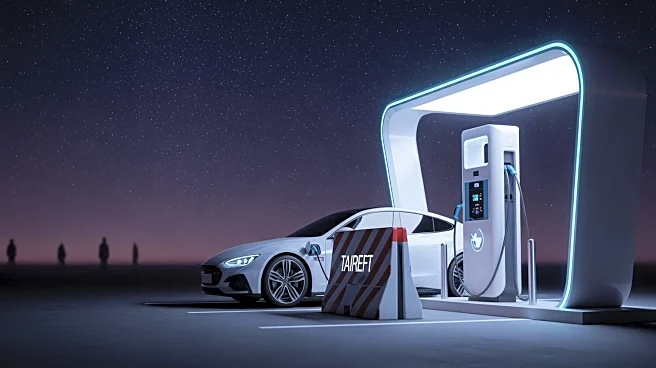What's Happening?
Tesla has announced record vehicle deliveries for the third quarter of 2025, totaling 497,099 vehicles, marking a 7.4% increase year-over-year. Despite achieving record revenues of $28.1 billion, Tesla's net income fell by 37% compared to the previous
year. The decline in profits is attributed to lower electric vehicle prices, increased spending on research and development, particularly in artificial intelligence, and tariffs on imported car parts and raw materials, which cost the company over $400 million. Tesla's finance chief, Vaibhav Taneja, indicated that R&D spending is expected to continue growing. CEO Elon Musk also revealed plans to deploy driverless robotaxis in Austin, Texas, by the end of the year, with expansion to additional states anticipated before the year's end.
Why It's Important?
The decline in Tesla's net income despite record deliveries highlights the challenges faced by the company in maintaining profitability amidst rising costs and tariffs. The increased R&D spending reflects Tesla's commitment to innovation, particularly in AI and autonomous driving technology, which could shape the future of transportation. The deployment of driverless robotaxis represents a significant step towards autonomous vehicle adoption, potentially transforming urban mobility and impacting industries related to transportation and logistics. However, the financial strain from tariffs and the need for continued investment in technology could affect Tesla's long-term growth and market position.
What's Next?
Tesla's focus on expanding its autonomous vehicle capabilities suggests further developments in its robotaxi program, with potential regulatory and public acceptance challenges. The company's strategy to manufacture its AI chips domestically may mitigate some tariff impacts, but ongoing geopolitical tensions could influence future trade policies. Stakeholders, including investors and industry competitors, will likely monitor Tesla's ability to balance innovation with profitability, as well as its response to external economic pressures.
Beyond the Headlines
Tesla's efforts to integrate AI technology into its operations could have broader implications for the tech industry, influencing trends in AI development and application. The company's approach to tariffs and domestic manufacturing may also reflect a shift towards localized production in response to global trade dynamics, potentially affecting supply chain strategies across the automotive sector.

















